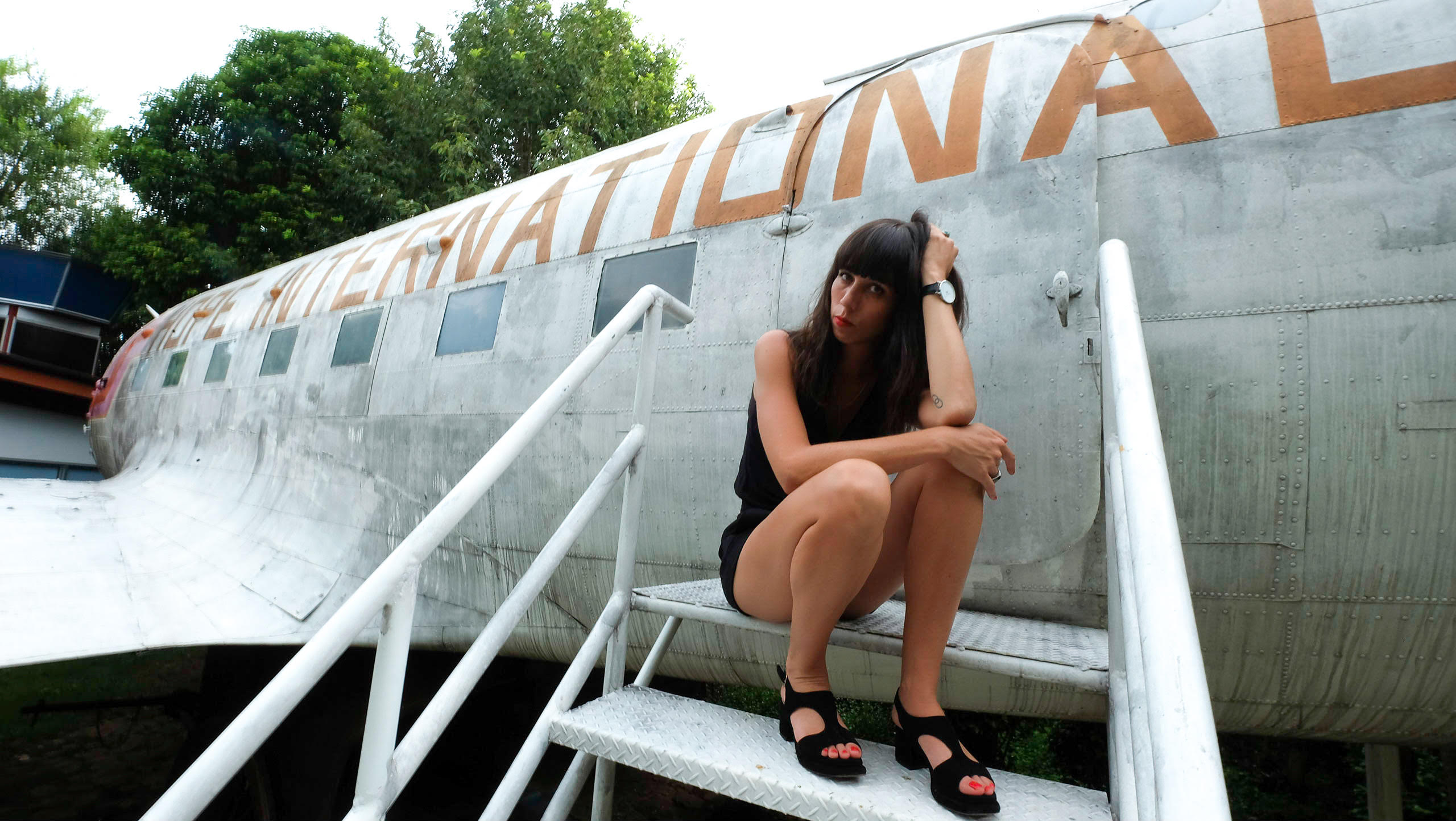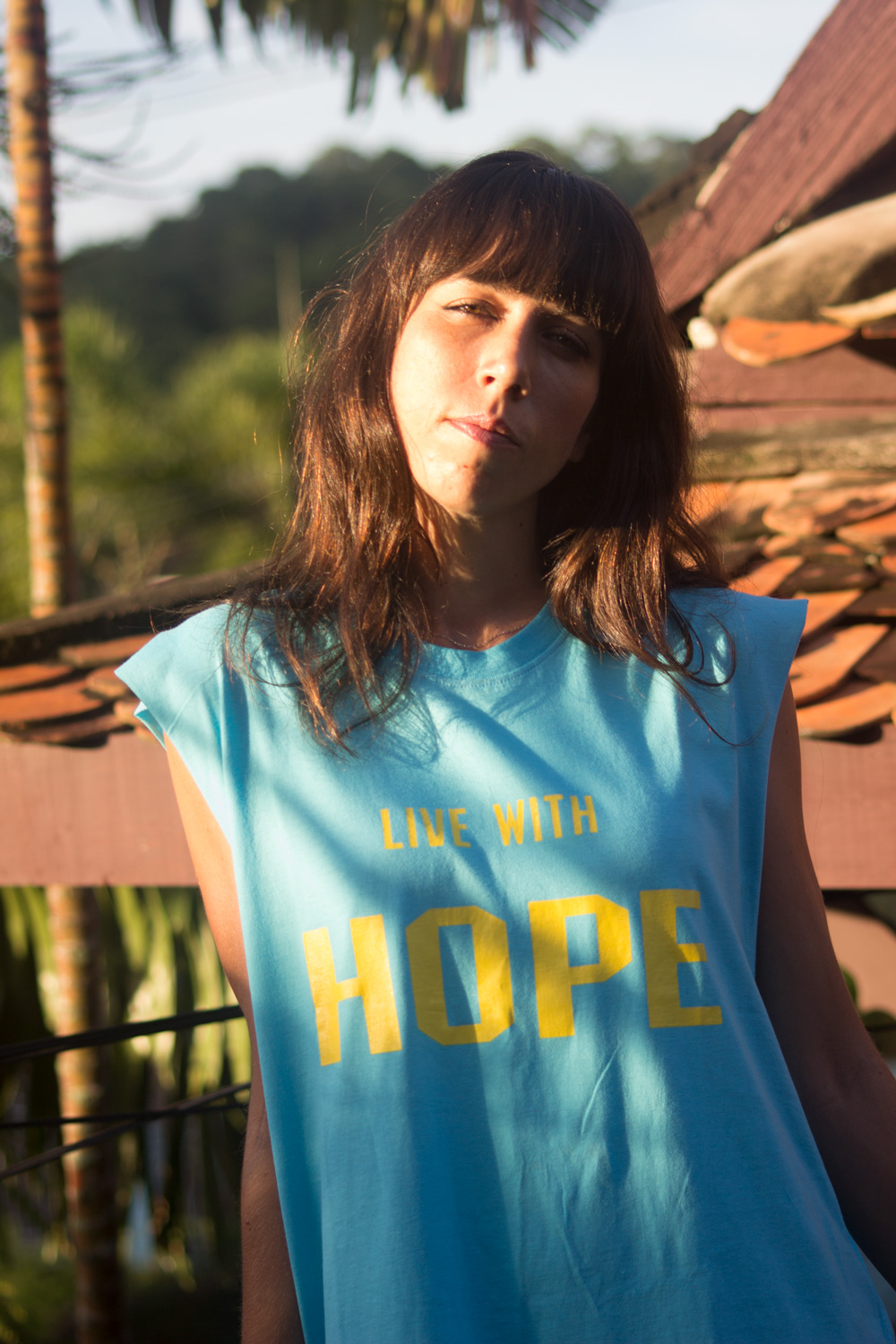Confessions of an Addict
‘What I Want to Tell You About Heroin’ is a new series from VICE friend and contributor Hannah Brooks. Hannah is a Melbourne based writer and musician, who has spent the past several years battling a heroin addiction. These articles were written while she was a guest of Hope Rehab in Thailand.
In drug recovery circles, the definition of insanity is repeating the same mistakes and expecting different results. It’s a lunacy which forces me to use against my will. I want to stop but I can’t. I am a monomaniac, seemingly possessed by an evil spirit whose only aim is to get and use as much heroin as possible.
Every day’s the same: at night, I vow to never use again. I snap the tips off syringes so they’re unusable. In the morning, I drive to my dealer’s house in my pyjamas, stopping off to get more needles.
The all-consuming need to use drugs has taken me places I never envisioned. Many lines have been transgressed. A man strangled me so violently I accepted I was about to die. I repeatedly had sex with a dealer in exchange for smack. I’ve had three old white cars in a row: the first blew up on my way to score because I never thought to put oil or water in it. The second I smashed into a retaining wall because I nodded off on winding roads. The third I rattle around in now, a filled syringe by my right thigh, ready to squirt out in case the cops pull me over.

I have lied, stolen, and sold everything of value. I’ve been arrested and strip-searched on the side of a busy road by a female officer who searched every part of me while six male officers looked on. I’ve sat in a cell for hours withdrawing from drugs, denied phone calls. I’ve been arrested for possession of a spoon. I contracted septicaemia from shooting up and almost died. I remember the look on my little brother’s face as he watched me writhing in a hospital bed in agony. I remember four doctors standing over me telling me that if I use again, I will die. I spent five days in hospital and scored the day I got out.
Friends have died. Friends have gotten clean and stayed clean. For a few years, I did too, after doing seven months in a rehab when I was 29. My friends who couldn’t stop called me The Great White Hope. I rebuilt my life and it became wonderful, but I became complacent and forgot. My addict brain convinced me using drugs was all in the past and I didn’t need to be totally abstinent anymore; I could socially drink. Within six months I had a needle in my arm after a break of almost three years. In another six months I lost everything I had gained in my abstinence. My fiancé – who, naively, thought that love was stronger than addiction – left me. The album we had just recorded was shelved. I stopped caring and focused on killing myself, one day at a time.
I hate myself for the things I have done but I keep doing them. I have ruined Christmas. I have ruined other families’ Christmases. I cannot open my mail without my psychiatrist’s help. I have 16 858 unread emails. I avoid social media. The last time I posted a photo of myself on Instagram was on the 25th of August 2017. I feel uncomfortable with the number of babies I see in my feed. I am happy for my friends but it’s a sharp reminder that I am not doing what other women my age do.
But I keep trying. I left Melbourne and retreated to Byron Bay, my strange, little hippie hometown on the East Coast of Australia. In three years, I’ve been to 19 rehabs, detoxes and drug clinics, both public and private. I have completed some, used in most, and been kicked out of many. I am deft at getting around urine tests. I have had rehab romances and suffered the consequences. I have tried Kratom, hundreds of NA meetings, and working the Steps. I admit that I am an addict and powerless over my addiction. I understand the problem and I know the solution. It’s just that, this time, abstinence eludes me.
It wasn’t always like this. I started and finished a university degree. I worked as a writer for years. I made documentaries and spoke at writer’s festivals. I played in bands, toured and recorded albums. I fell in and out of love. I had many friends and I answered the phone when they called, which these days, I do not. From 17 to 27 – when I began using heroin – I was ambitious and productive; a high-achiever. I believed in myself and my talent. I had purpose. I used a lot of ‘fun’ drugs. I drank wine every night but so did everyone. My friends popped pills, snorted lines of coke off shiny pianos, guzzled sake and sang karaoke.
It was on a work trip to the snowfields near the Victorian border that I realised I was physically addicted to heroin. I had just broken up with someone I loved deeply. I started on heroin – straight to shooting up – because I stopped caring and the other drugs stopped working. I’d been using for a few months, most days but not every day, and still believed that I could stop at any point. We were away for three days and I began to suffer withdrawals. Being in the snow and slipping on ice didn’t help. I was junk sick for the first time while I took a snowboarding lesson. As soon as I crashed, I headed for the nearest bar and drank whiskey before noon. I acted like an asshole. I didn’t understand what was happening to me.

Why me? My peers were as reckless as I was, or at least I was under the impression they were. I had been diagnosed with clinical depression and anxiety but so had most of my friends in their early 20s. So why did I end up an addict? Why did I cross that invisible line and not them?
I’m trying something new: attempting to get clean in another country, Thailand. I’m on my way to Hope Rehab – the one that Pete Doherty and Cat Marnell both went to and raved about –, which is in Sriracha, a coastal town an hour out of Bangkok. I am tired of being ashamed about my addiction. I am tired of being told: “just stop”. I am tired of the stigma, the hiding, avoiding the elephant in the room. I’m not sure why, but I finally feel ready to write about it. I have nothing left to lose.
I swallowed eight Valium and had my final shot in a desolate part of Brisbane close to the airport. Immediately, I could not keep my head off my chest, which is exactly how I wanted to be. I ranted at my boyfriend. “I am not getting on the plane”. “I’m going to call Italian Billy and get enough heroin to kill myself”. I didn’t see how going to another rehab would help. Why would this be any different?
Somehow, after six cigarettes and a round of shoplifting, which I do when high, just because I can – two Guerlain, one Tom Ford and one YSL lipstick, all similar shades of red, and a huge pair of black sparkly Gucci glasses – I’m on the plane, wrapped in a purple Thai Airways blanket. I order a glass of red and immediately spill it on myself. I nod off, my head sticking out into the aisle. Nine hours later I arrive and spot my driver wearing the green Hope cap.
The irony that the rehab is called Hope is not lost on me. But the property is beautiful, statues and shrines scattered around the grounds, small cats weaving between them. It’s been hours since my last shot and I’m feeling bad so the medical man, Doug, gives me some methadone. An intern gives me a bright blue T-shirt with yellow letters saying, ‘Hope is Everything’. There are people everywhere, smoking, some in Hope T-shirts and prayer beads. A few introduce themselves and I immediately forget their names. A British woman hands me a can of insect repellent. A German girl gives me Oreos and a stick of Mentos.
I’m assigned a room in the main house. Even though the staff carry my bags I can barely climb the stairs. The room is light and airy, with a huge private balcony in line with the tree tops, overlooking the ocean. The mirror tells me I’m a mess. I have long, dark hair but because I spend all my money on smack, I cut it, wonkily, myself. My gel nails have grown into red crescent moons.
I’m supposed to settle in and rest, but I don’t know what to do. I peel the ‘Hope Changes Everything’ logo off the water bottles and stick them on the coffee table. I rearrange my toiletries. I skype my boyfriend who is palpably relieved. I write lists about how to unscramble my life. Later, I get more methadone and diazepam and crawl into the soft, white bed. I’m anxious and afraid, but I’ve done the hard part. I’m here.
The writer was a guest of Hope Rehab Thailand at the time of writing this article.
If you, or someone close to you, is battling addiction help is available through the following resources:
This article originally appeared on VICE AU.